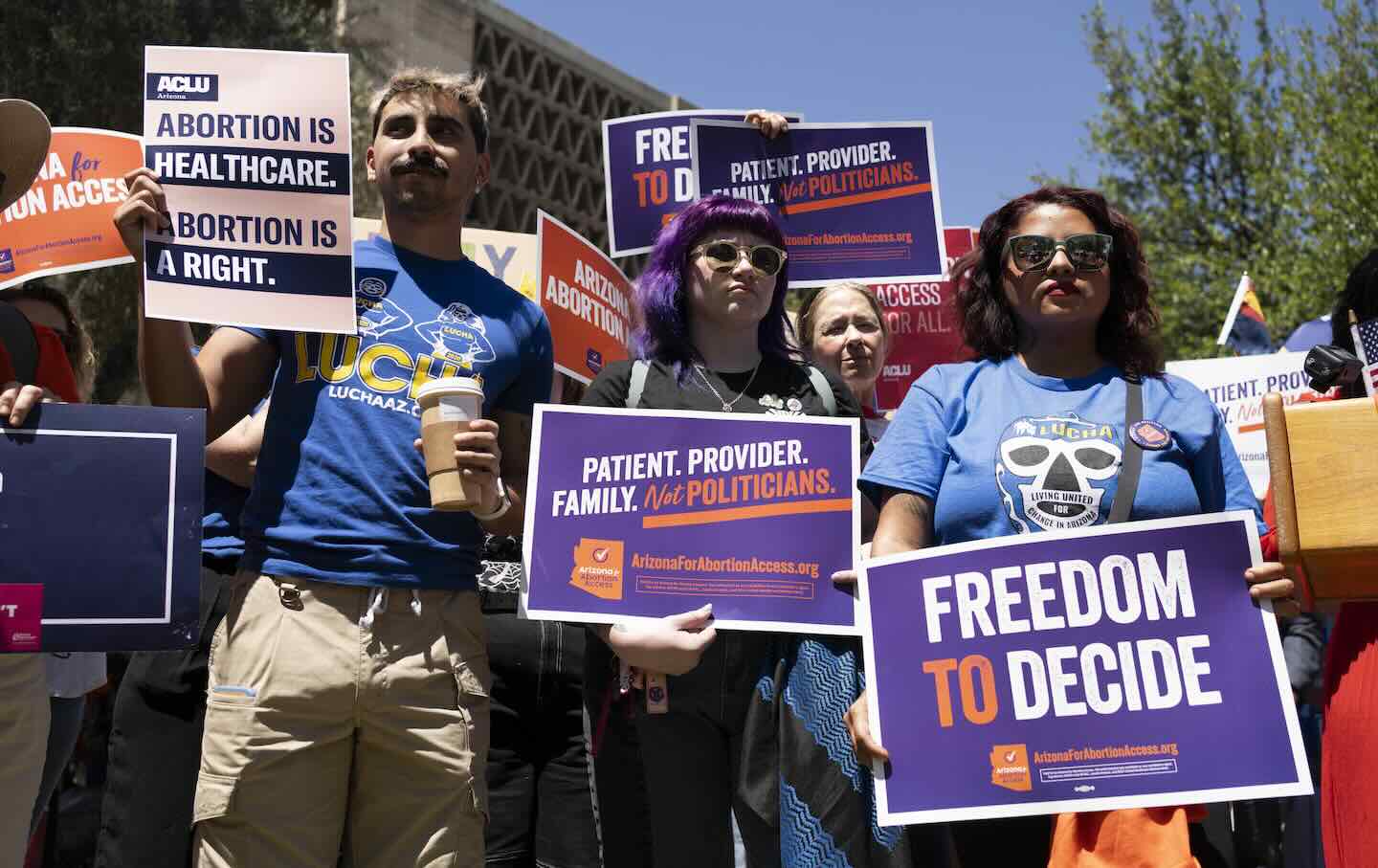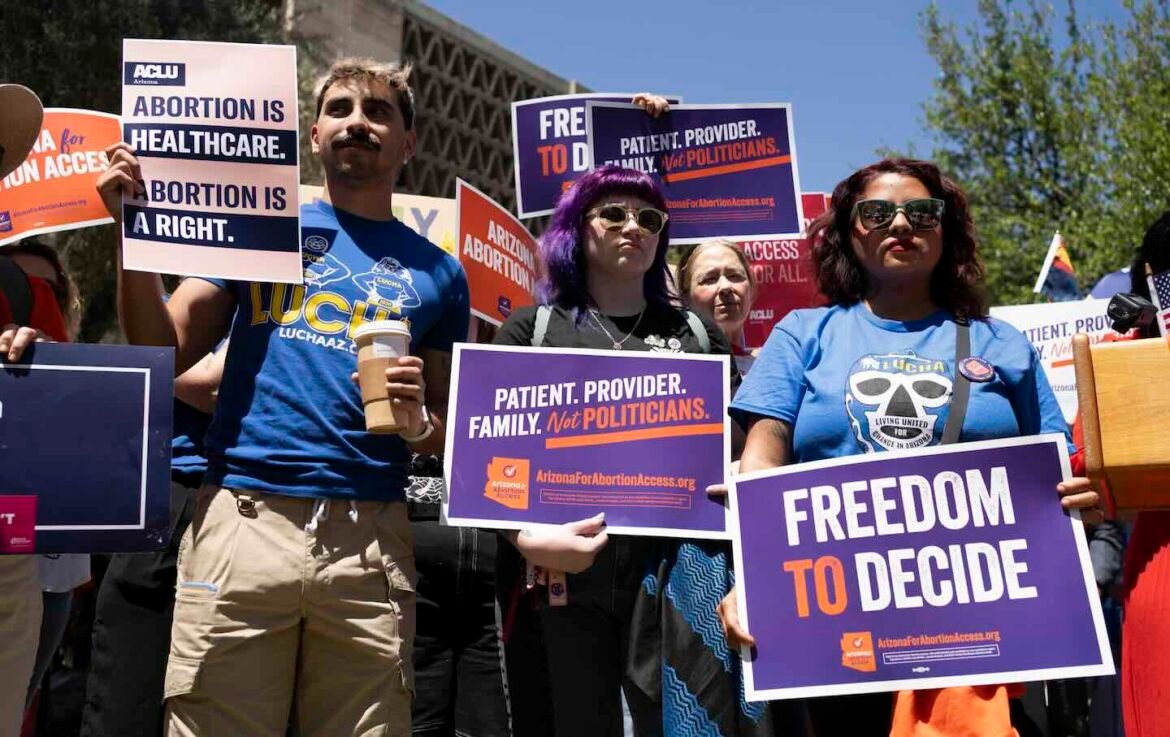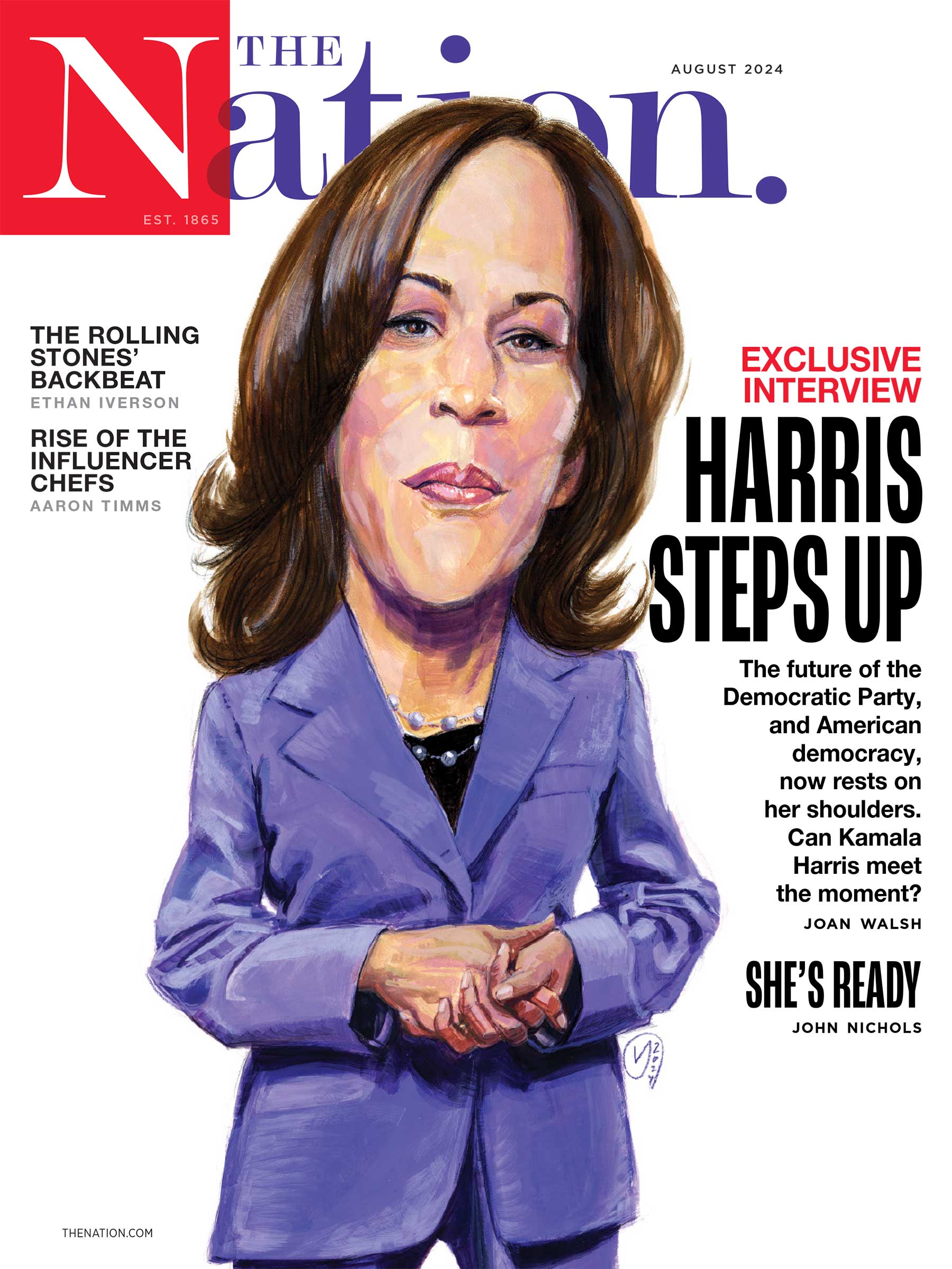The GOP has been desperately trying—and failing—to shift the public’s attention onto other issues.

Members of Arizona for Abortion Access, the ballot initiative to enshrine abortion rights in the Arizona State Constitution, at the Arizona House of Representatives on April 17, 2024, in Phoenix.
(Photo by Rebecca Noble / Getty Images)
Arizona for Abortion Access announced on Monday that its ballot initiative has qualified for the November election. This was the result of a huge grassroots effort: Over the last few months, the coalition had mobilized thousands of volunteers to collect more than 577,000 signatures—hundreds of thousands more than were needed—to put its initiative on the ballot.
Proposition 139 aims to modify Arizona’s state Constitution to ensure that abortion access can’t be curtailed by the legislature or the courts. It is the latest in a series of abortion ballot measures around the country to qualify for the general election in the fall.
Missouri’s also qualified this week, and five other states—Colorado, Florida, Nevada, Maryland, and South Dakota—have already seen ballots qualify for November’s election. Abortion access campaigners in Montana and Nebraska are still waiting to see whether their initiatives will qualify.
None of this is good news for Republican presidential nominee Donald Trump and his MAGA campaign.
Back in the spring, the Arizona Supreme Court reinstated an 1864 ban on abortion. Even though it subsequently put a hold on enforcing the law, and even though a handful of courageous GOP Assembly members and senators swiftly joined with Democrats to overturn that law and to replace it with a 15-week ban, the court ruling put the issue front and center for voters, reminding them that when it comes to protecting basic rights in the post-Roe era, there is no room for complacency.
This is a vote-loser for the GOP, and party strategists know it. That’s why they have been desperately trying to shift the public’s attention onto other issues, whether by downplaying the issue’s importance in the party platform or barely uttering the word at the Republican National Convention. But even while GOP leaders try to distract voters with issues like immigration, the economy, crime, or pretty much anything but abortion, reproductive rights have not disappeared from voters’ minds. After the court ruling, the signature-gathering effort accelerated, and each day huge numbers of voters signed Arizona for Abortion Access’s petition to put Prop. 139 on the ballot and write abortion access protections into the state Constitution.
“Our signature collection effort shows the broad support and popularity of protecting abortion access, and we fully expect that enthusiasm to show up on Election Day as well,” Dawn Penich, spokesperson for the coalition, told me earlier this week. “It’s clear that a desire to protect bodily autonomy and ensure the privacy of personal medical decision-making crosses party lines. Voters come to this issue from different angles, sometimes women’s rights, other times small government, but the opinion that all people should be able to navigate healthcare options with their doctors and families, not have politicians and judges calling the shots, is deeply bipartisan.”
A CBS poll in May of this year found that two-thirds of Arizona voters wanted abortion to be legal in all or most cases, and more than half said that abortion was a major factor for them in this year’s elections.
Throughout 2023 and the first half of 2024, Trump built a strong position in Arizona against an increasingly ineffective President Biden. Had the election been held this spring, the MAGA candidate would have almost certainly won the state. Nearly a month after Biden ended his reelection bid, however, it’s a whole different ball game in the Grand Canyon State. The Democratic presidential nominee, Vice President Kamala Harris, has recouped ground lost by Biden. The Democrat’s candidate is, according to many recent polls, now leading Trump in the state by a small margin. She is also starting to pull ahead in neighboring Nevada.
That shouldn’t be a huge surprise. In both states, a solid majority of voters supports abortion access, and in both states national elections have been trending blue in recent cycles. Trump’s lead in those states always had more to do with apathy around, or anger at, the octogenarian Biden’s candidacy rather than a sudden surge in support for the policies and worldview pushed by Trump. In my reporting in Nevada and Arizona earlier this year, I interviewed numerous voters who seemed to be craving a younger, more dynamic Democratic candidate. They talked about sitting out the election; some of the younger people I interviewed even said that they hated both candidates but would likely vote for Trump simply because he was more entertaining. That calculus has, in the space of a few weeks, utterly changed. Now, it is Trump who is the stale candidate, and Harris who is the change agent, bringing out the large crowds and bringing in the campaign donations and volunteers.
Recent polling in the state by HighGround put Harris two points ahead of Trump, a huge swing away from the MAGA candidate since Biden announced he would not seek reelection. Bloomberg and several other polling agencies have also put Harris ahead. And while the Trafalgar Group poll last week did find that Trump has maintained a sliver of a lead in Arizona over the past few weeks, that poll was sponsored by the GOP and should be taken with at least a pinch of salt. In polling with Kennedy factored in as a candidate, the same reversal in fortunes holds; in a state that seemed a lock for Trump less than a month ago, he is now struggling.
“Part of what we are seeing in the Harris numbers,” HighGround’s Paul Bentz explained, “is increased enthusiasm among younger voters who were not excited about a matchup between two septuagenarians. Combined with the qualification of the Abortion Access bill, we could see younger voters show up and increase turnout to the near-record 2020 levels. Republicans would prefer lower turnout where their reliable voters have more influence.”
Of course, there are still more than 10 weeks until the election, and it’s possible Trump can make up the ground that he has lost. Not to mention that the GOP didn’t fail completely in its attempts at undermining the ballot initiative; a related pamphlet that will be distributed to voters will include anti-abortion language that identifies a fetus as an “unborn human being,” which, Arizona for Abortion Access explained, introduces bias where voters deserve neutral, fact-based information.
Still, the momentum is clearly now with Harris, and the recent news about Proposition 139 qualifying for the ballot is ultimately good for the Democrats as they seek to maximize voter participation and find issues likely to drive their supporters to the polls.
Can we count on you?
In the coming election, the fate of our democracy and fundamental civil rights are on the ballot. The conservative architects of Project 2025 are scheming to institutionalize Donald Trump’s authoritarian vision across all levels of government if he should win.
We’ve already seen events that fill us with both dread and cautious optimism—throughout it all, The Nation has been a bulwark against misinformation and an advocate for bold, principled perspectives. Our dedicated writers have sat down with Kamala Harris and Bernie Sanders for interviews, unpacked the shallow right-wing populist appeals of J.D. Vance, and debated the pathway for a Democratic victory in November.
Stories like these and the one you just read are vital at this critical juncture in our country’s history. Now more than ever, we need clear-eyed and deeply reported independent journalism to make sense of the headlines and sort fact from fiction. Donate today and join our 160-year legacy of speaking truth to power and uplifting the voices of grassroots advocates.
Throughout 2024 and what is likely the defining election of our lifetimes, we need your support to continue publishing the insightful journalism you rely on.
Thank you,
The Editors of The Nation

